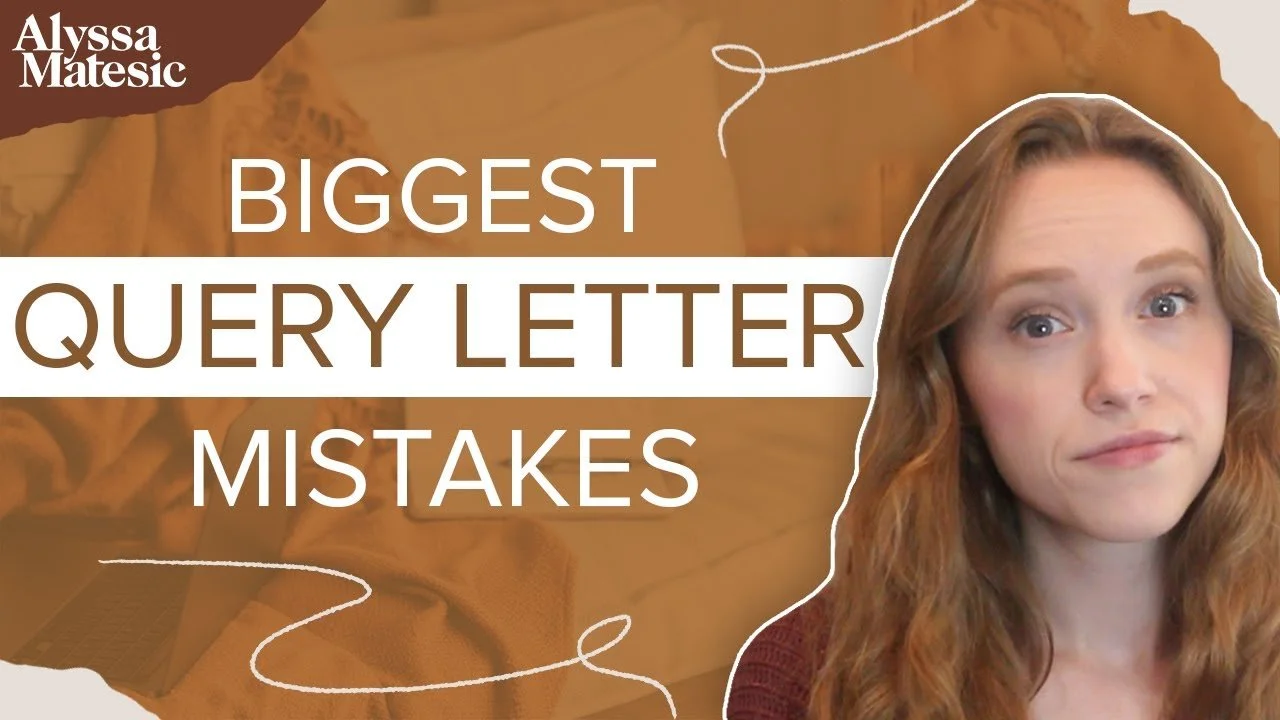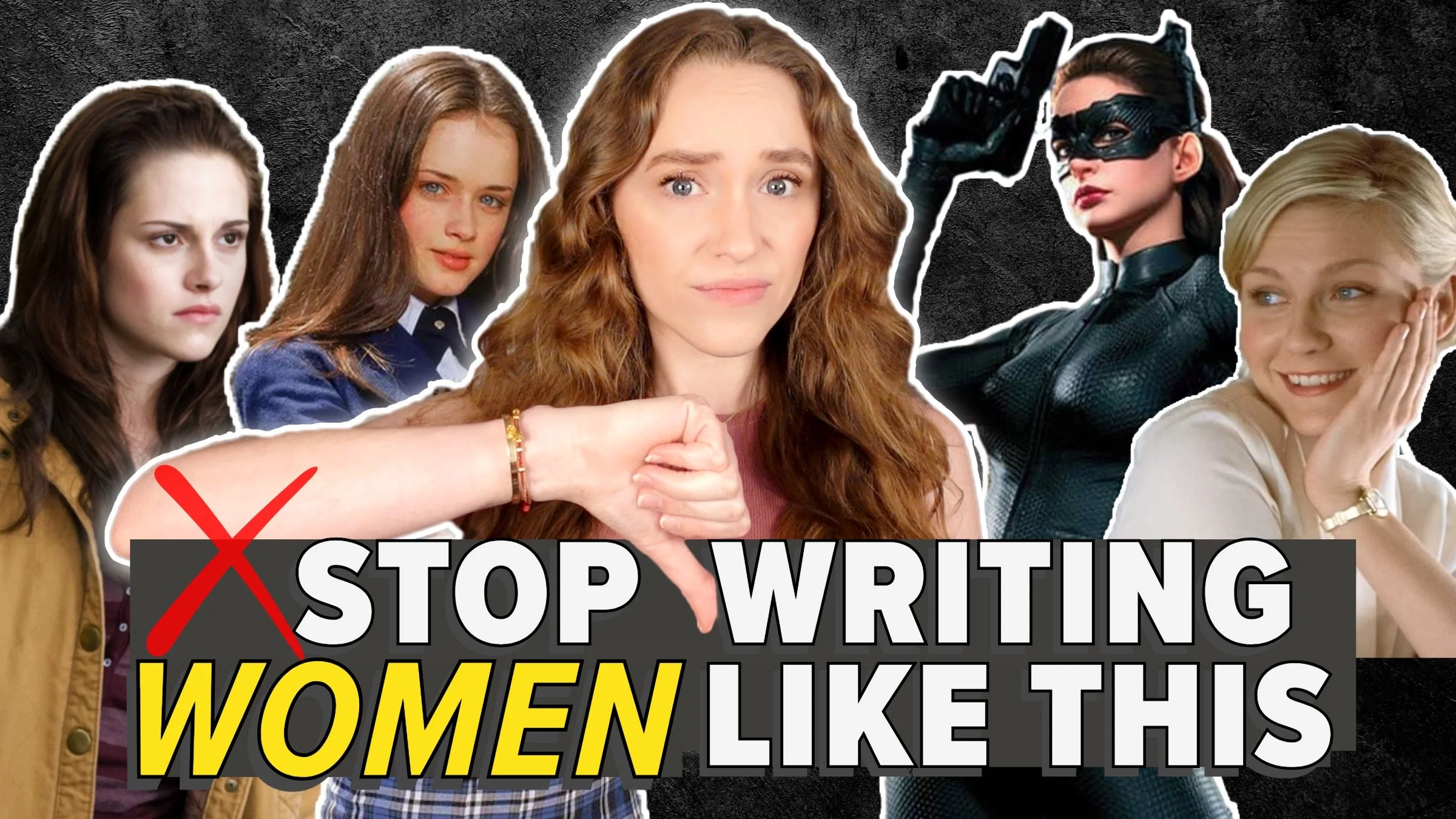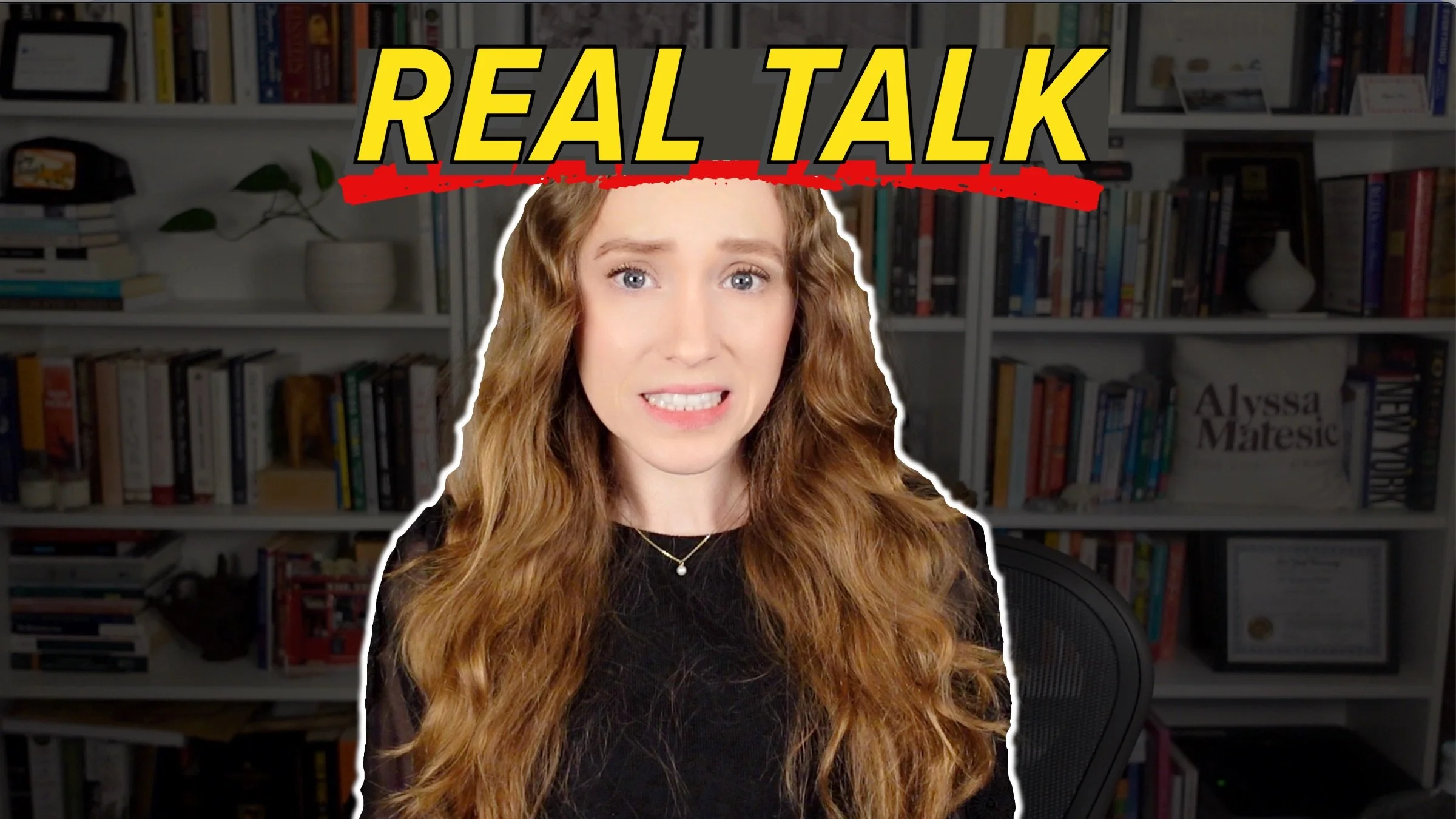3 Common Literary Agent Query Letter Mistakes
HIT PLAY OR READ THE POST BELOW:
If you have been sending out literary agent query letters and not hearing back or worse, getting rejections, it might be time to step back and review your materials. Although the query letter is a short document, there’s still room for error. In this article, I go over the three most common query letter mistakes that I’ve seen when reviewing authors’ queries to literary agents.
Having reviewed hundreds and hundreds of query letters, I have a good sense of what makes a query letter stand out to an agent. Some of these things might seem trivial or overly formal. However, knowing this information will only increase your chances of success. Admittedly, the publishing industry is flawed. But, if you work the system and you know how to play the game, you can up your chances of success with traditional publishing.
So with that, let's dive into some examples of query letter mistakes.
1. Not Being Personalized
In my opinion, the most important mistake is if the query letter is not personalized. Out of the hundreds of query letters I have reviewed, it is the most consistent element that’s lacking, yet it’s simple enough to add in to take the letter to the next level.
It can feel forced or awkward to write a personalization line in the query letter, and it does admittedly put a little bit more work on you when reaching out to multiple agents. But by showing that extra sentence of effort, it will make your query letter stand out to the agent reading through their submissions or the assistant working their way through the slush pile. By making a reference the agent will recognize, they'll better understand why you envision yourself on their client list.
For example, when I was working as a literary agent assistant, when someone would mention the agents by name or mention one of their other clients, I would immediately pay more attention to that query letter. I knew the writer did their research and knows what that specific agent is all about, which implied that their project would also appeal to my boss.
A really good comparison here with the personalization line is that it's similar to a cover letter that you write for a job application. It's fine to send a template cover letter to every job you apply to, but it increases your chance of success if you weave in some personalization.
I recommend putting the personalization line right at the beginning of the literary agent query letter. Again, an agent has hundreds of submissions at any given time, and if they are reading through yours and see a personalized first line, you are going to increase the odds of engaging them.
Regarding what to write, there are a few different things that you could mention in the personalization. You might call out a specific thing from the agent's bio.
For instance, an agent might say, “I'm looking for World War II historical fiction from a female point of view.” If your novel also falls into that category, you could use this example of a query letter personalization line: “I saw that you were looking for World War II novels from a female perspective, and my novel fits that category. I hope it interests you.”
Now, the best way to personalize your query letter, in my opinion, is to reference clients or specific books that the agent has represented. This shows that you have looked at their client list and the books they have worked on — potentially even read them (or at least their summary) — and are now drawing a connection between their past projects and the new project you’re offering.
Of course, this is a very time intensive option and not necessary for every agent on your list. But, for those dream agents on your list, I would strongly recommend going the extra mile and doing that extra research because it is the best way to grab their attention.
In the query letter itself, the personalization will be just a sentence or two. It’s not about overly complimenting the agent or boosting their ego. It’s simply there to draw that connection and engage the agent. Another example of a query letter personalization line is: “I saw that you represented [TITLE]. My novel, [TITLE], is also [GENRE], with a similar gritty tone.”
In order to keep the sentence short and to the point, mentioning just one title will get your point across. And, in the end, if you can’t find a perfect comparable title for an agent, refer to an element from their profile or bio online.
By adding the personalization sentence to your letter, you can engage literary agents right from the start of your query letter.
2. Vague Plot Blurb
The next mistake I see in literary agent query letters is vague plot blurbs. The plot blurb is the core of your query letter, as those paragraphs are going to make or break the agent’s interest. If they decide the subject matter of your manuscript interests them, they will go on reading your sample pages. If they don’t, they will reject you without going further.
So, the plot blurb needs to strike the perfect balance of intriguing the agent without giving the whole book away. You want to give them enough information about your story so they have a tangible sense of what it's about. If you are overly vague, it's unlikely the agent will be interested enough to dive into those sample pages.
This issue is best explained through a query letter example, so here’s a quick sample plot blurb:
Jane and John have been best friends since fifth grade, but John has always secretly hoped for more. Now in high school, he plans to tell her how he really feels, but everything goes wrong, leading to a spiral of lies that makes them question their friends, family, and futures.
Immediately, there are issues with this blurb. First, there is no understanding of how John and Jane became best friends, meaning we don't understand their backstory. Second, there’s no explanation of how or when he's going to finally tell her how he really feels. And third, we don't know what is meant by “everything goes wrong.” That's very unspecific—did John do something wrong? Did Jane? Is it something external out of their control? We don't know. Finally, the “spiral of lies” is overly vague and also introduces what seem to be key plot points too late in the blurb.
Overall, it's really hard to get a sense of what this book is even about. There's really very little plot information here. Here’s another example of the same blurb, but tweaked so that it's more specific:
Jane and John have been best friends since they met on a field trip to the White House in fifth grade. But John has always secretly hoped for more. Now that they're seniors, he plans to tell her how he really feels at the homecoming dance.
But when she applies early decision to a college 2,000 miles away without telling him—and then gets in—John confesses his love in a heated frenzy. With their friendship fracturing, their friends pick sides and their families face their own trials. Jane and John must decide what they want their futures to be—and if those futures include each other.
Now we're given a lot more details that give a sense of what the story is about. First, we learn that Jane and John met on a field trip to the White House, which is generally interesting but also tells us the story could be set somewhere near DC. Second, we learn that he's going to tell her how he feels at the homecoming dance, which gives us a timeline as well. Third, we now understand what fractured their friendship (Jane going to a college far away), which is a crucial turning point for this story.
Admittedly, the last line here is still somewhat vague, but we still have a better sense of what the conflicts entail. Their friends are picking sides, their families seem to have some other kind of problems going on, and they need to decide if they will stay together in the future.
To summarize, in a plot blurb, you want to be detailed at the beginning in order to draw in the agent’s attention without giving away all the story’s twists and turns. Anywhere between two to three short paragraphs will do the trick!
3. Poor or No Comp Titles
The final mistake I often see in query letters is poor comparable titles or none at all. Having good comparable titles can also really make your query letter stand out. Although they aren’t a requirement, it is one of those things that, like the personalization line, can elevate your query letter to the next level.
This is because comp titles actually tell the agent quite a few things. One, they give the agent a sense of what your intended audience is. If you're just describing your manuscript with a broad genre, such as historical fiction, it doesn't indicate what specific audience within the historical fiction genre you are targeting. If you compare it to other books, then there is an assumed overlap of audience with your book and the other book, which helps the agent conceptualize a potential pitch. Remember, an agent's job is to help get your book into readers' hands. So, the sooner you and the agent have a sense of who that reader is, the better.
Secondly, the comparable titles can also give the agent a sense of your writing style, especially if it's a more literary work uncategorized by genre. Comparing it to other literary authors will help them get a sense of the flavor of your writing.
And lastly, the comparable titles can also show that you have a bit of industry knowledge, which will be appealing to an agent. You’ll come across as knowledgeable about what recent books have been published. Also, it shows that you read a lot in the genre you're writing in, and all of those are really positive qualities to express to an agent.
Sometimes writers will try to convey all of the qualities of their book through editorial commentary in the query letter. But commentary coming from you doesn't sound as strong as it does if you are weaving it in through a comparison to other published books.
Here is an example of a query letter’s book description without comparable titles: “My novel adopts a distinctive first-person voice and illuminates little known facts about World War II history.”
If we weaved in some comp titles, it would look like: “My novel adopts a distinctive first person voice like [BOOK] and illuminates little known facts about World War II history in the vein of [BOOK].”
By adding these comp titles, we can see the landscape of the other published books that your book fits within. When I’m reviewing literary agent query letters, the second approach with the comp titles sounds more assured and convincing than the first.
I recommend using two to three comp titles that have been recently published. Don’t use canonical titles such as The Great Gatsby, as they’re not representative of the stories being published today, and also avoid major bestsellers such as Harry Potter or Gone Girl, as these books are seen as outliers to the average novel, and thus not realistic to use in a pitch.
By sticking to books published within the past ten (or better, five) years that are reasonably known, you can confidently research the best books to use as comparative titles.
Now, what if the agent hasn't read the books that are listed in your query letter? That's not really a concern because even if the agent hasn't read the entire comp title, they will at least have a sense of that book because they’re tuned into the industry. The Big Five publishing houses only publish so many books a year, so agents are generally aware of nearly all books published in their genre every year. And, of course, they can always look a title up if they aren’t familiar.
One other thing you need to think about with the comp titles is who they’re published with. For the most part, comparative titles should be published with a major publishing house. I wouldn't recommend listing self-published titles since you are ultimately seeking traditional publishing by querying literary agents.
That said, don’t pick obviously low-selling traditionally published books—which you can double check by seeing how many reviews they have on Amazon or Goodreads. If a title only has 50 reviews (unless it was just published), it’s likely a low-selling book, and listing a title like that as a comparison defeats the purpose of listing a comp title, because the whole purpose of comp titles is to show your book’s potential success. The implication is that your book will sell similarly to the comp title, so try to find similar, well-selling books.
I hope these common mistakes help you craft stronger literary agent query letters and ultimately feel more confident about the querying process.
Thanks so much for reading, and happy querying!






